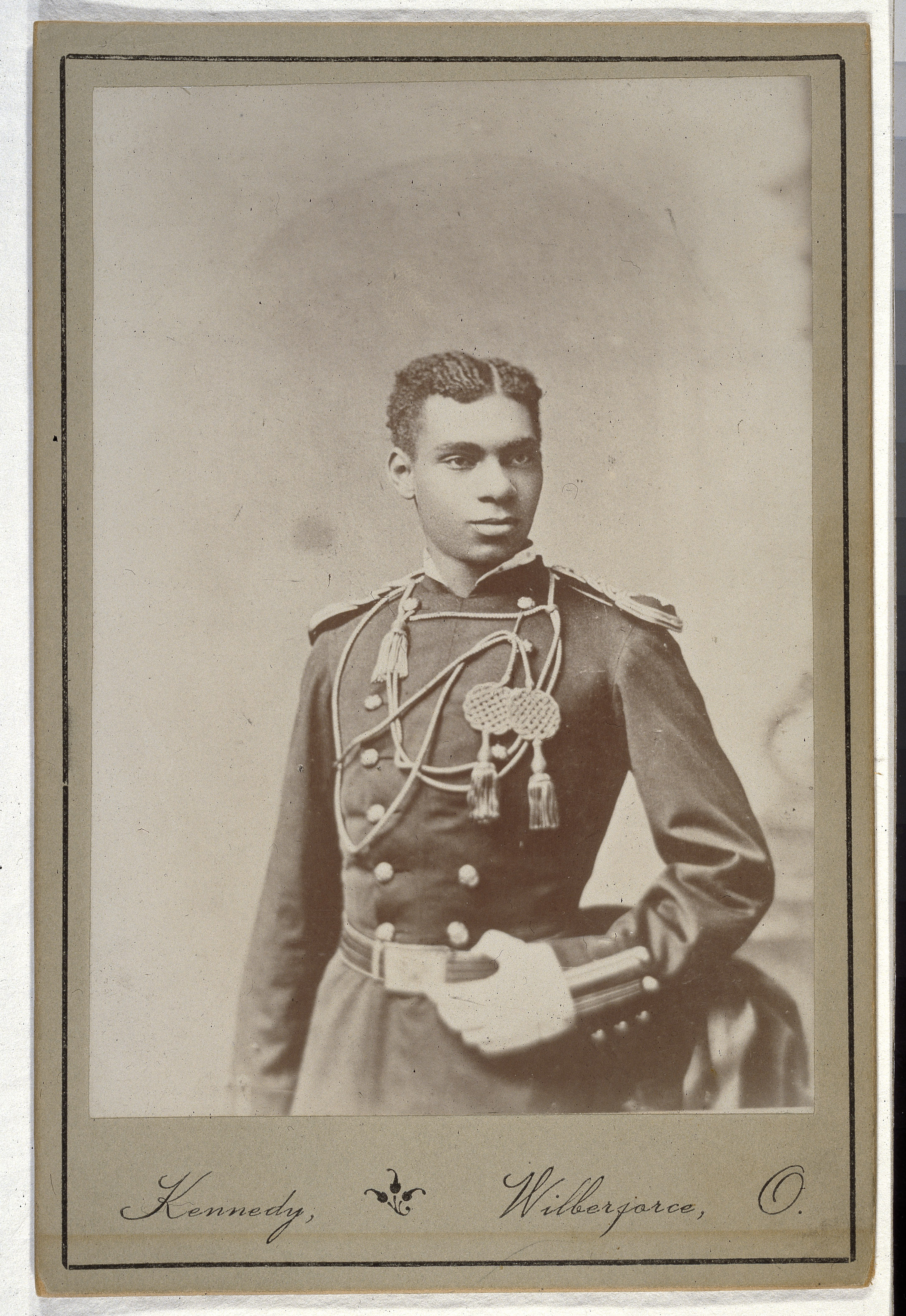Article first published in Vol. 18, 1999.
By Arminta C. Garner, Jesus Saenz and Myriam Y. Frias.
Henry Ossian Flipper has risen, fallen and risen again in our nation's history. On February 19, 1999, President Bill Clinton posthumously pardoned Flipper, the first black West Point graduate, for a conviction on trumped-up charges that netted him a dishonorable discharge.
Born in Thomasville, Georgia, as a slave on March 31, 1856, Flipper was the oldest son of five boys born to Isabella Bucknere and Festus Flipper. Like Henry, his brothers would become professional men, including an ordained bishop, a wealthy farmer, a professor and a physician.
Henry learned to read at eight from a slave named Ponder, who taught him in his woodshop at night. Flipper received his appointment to West Point while he was a student at Atlanta University. In 1873, Flipper began his education at the military academy, one of few black cadets.
 Image caption: Henry Flipper, By U.S. House of Representatives. Committee on Military Affairs. (03/13/1822 - 1946) (http://research.archives.gov/description/2668824) [Public domain], via Wikimedia Commons.
Image caption: Henry Flipper, By U.S. House of Representatives. Committee on Military Affairs. (03/13/1822 - 1946) (http://research.archives.gov/description/2668824) [Public domain], via Wikimedia Commons.
Enduring racial slurs and discrimination from other cadets, Flipper studied civil engineering and Spanish, two subjects that would serve him well in the Southwest later in life. Graduating in 1877, Lt. Flipper distinguished him self as the first black graduate of West Point, ranking 50th of the 76 cadets in the class.
Upon leaving West Point, the young Georgian accepted a role as an officer in the 10th Cavalry, one of the famed divisions of "Buffalo Soldiers." These black soldiers were so named by Indians who saw a similarity in the texture of the buffalo's fur and the soldiers' hair. Flipper was the first black officer in the U.S. Army.
In charge of the post commissary, Flipper was accused of stealing quartermaster funds in 1881. Charge with embezzlement, he was found not guilty of embezzlement in a court-martial but guilty of conduct unbecoming an officer. The Army dishonorably discharged him.
Although the judge advocate general of the Army concluded Flipper had been wronged because of his race, then President Chester A. Arthur upheld his conviction.
After his discharge, Flipper traveled up the Rio Grande to the El Paso-Chihuahua area. He worked as a clerk in a steam laundry, but in 1883 Henry became a land surveyor with the American Land Company of Chihuahua. Using his skills in Spanish and engineering, Flipper worked as Executive Secretary for the Sierra Mining Company. Flipper later surveyed and mapped areas of El Paso and Chihuahua. In El Paso, he lived in the 500 block of South El Paso Street.
Flipper went to Nogales, Arizona, in 1885, preceded by his fame as engineer and Spanish translator. Here, Flipper was hired as a special agent to the court of Private Land Claims. It was in this position that he saved many people from losing their land.
In the 1880s, many residents of Nogales fought land grants claimed by members of the Camou and Elias families. During a one-year legal battle that ensued, Flipper used his knowledge of Spain and Mexican laws, as well as his Spanish translating skills, to win the case for Nogales citizens. In 1895, Flipper also became the first black man to serve as editor of the Nogales Sunday Herald.
But all of his fame and respect did not shield Flipper from the racism of the time. He was unable to marry a Mexican woman name Luisa Montoya because the laws of the time prohibited interracial marriage. The couple stayed together for less than a year.
Flipper left El Paso in 1919 for Washington, D.C., where he became assistant to the Secretary of the Interior and held various government jobs. Flipper died 1940 in Atlanta, Georgia.
Image caption: Drawing By J.H.C. (The Colored American, August 18, 1900) [Public domain], via Wikimedia Commons
Throughout his life, he had fought to clear his name, but he died before that happened. Almost 100 years after his court-martial, in 1976, his case was reviewed.
Flipper's name was cleared by the Army Board for Corrections of Military Records. The Board denied criminality and ruled that Flipper's punishment had been too severe. The records were changed to reflect an honorable discharge. Only a President could set aside his conviction, however. Now that Clinton had done that, the rest of America is also beginning to learn about this extraordinary man who has received many posthumous awards. West Point annually presents the Henry Flipper award to honor a cadet who has distinguished himself despite unusual circumstances.
The Public Broadcasting System has presented the one man television drama by El Paso artist and writer Bob Snead about Flipper entitled "Held in Trust" several times. Snead, along with other prominent black citizens, has been responsible for educating the community and the rest of the country about Henry O. Flipper and other Buffalo Soldiers.
Slave, military cadet, officer, engineer, translator Henry Ossian Flipper was a pioneer for black Americans everywhere. El Paso was fortunate that he made his home here, even for a while.
Tags: biography
 The Court Martial of Lieutenant Henry Flipper by
The Court Martial of Lieutenant Henry Flipper by